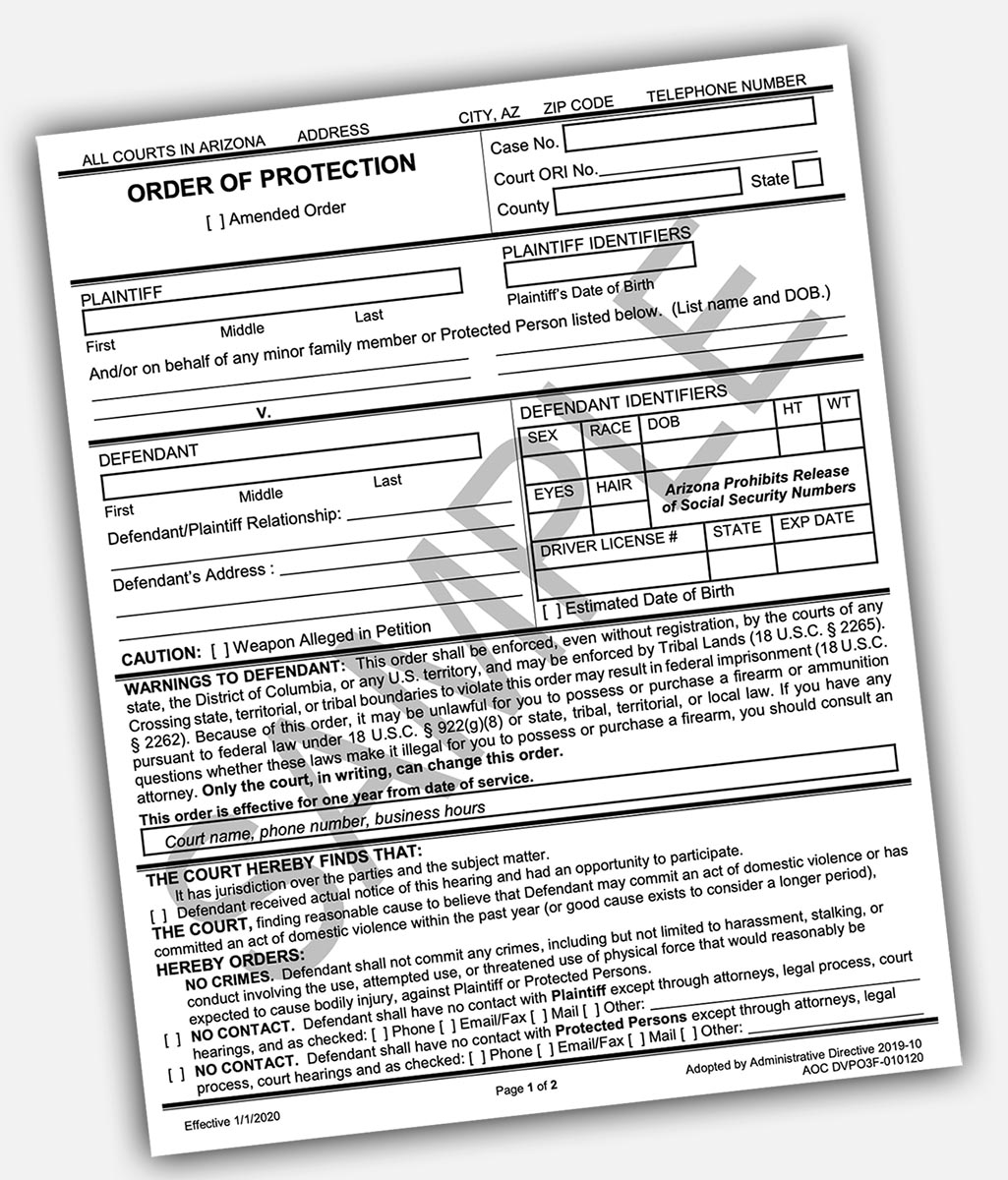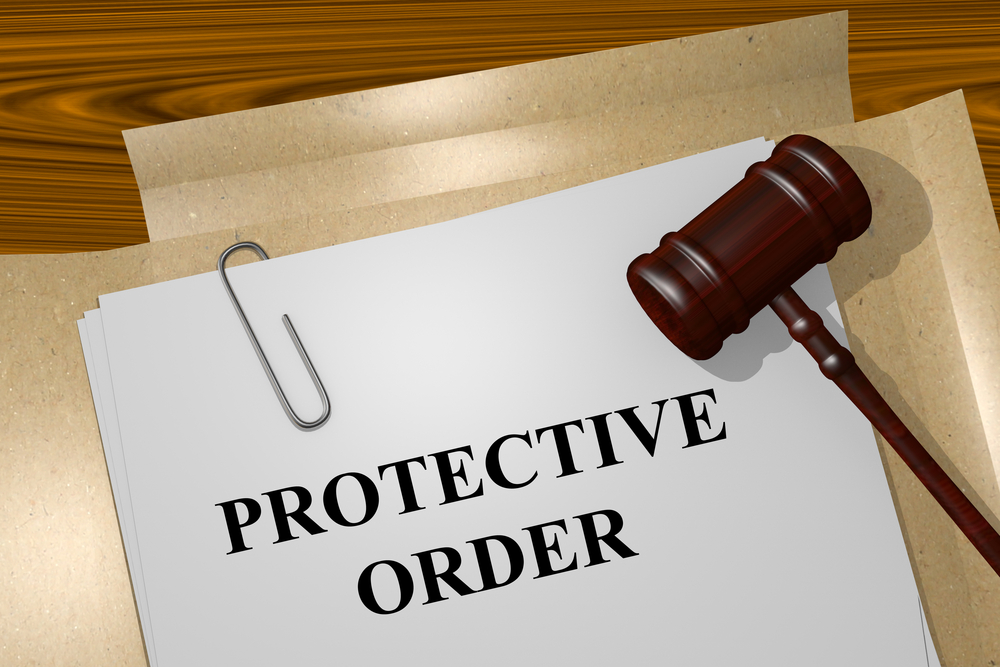Arizona Order of Protection & Injunction Against Harassment
Schill Law Group has a dedicated team of attorneys who will work with you to contest your order of protection or injunction against harassment. Our lawyers have decades of experience in both family law and criminal law cases that involve these orders. We utilize our experience and dedication to uncover all of the unique facts in your case necessary to successfully present your defense to the court.
– Order of Protection & Injunction Against Harassment Lawyers
Contesting An Order of Protection
Many times orders of protection are used unjustly in family law cases when one party tries to gain the upper hand in a case by making accusations against the other party. This tactic is painful to the party being accused and is something that our family law lawyers see far too often. If this has happened to you and you are unsure how to proceed, we can help.
The attorneys at Schill Law Group have decades of expereince successfully contesting orders of protection and injunctions against harassment in criminal and family law courts throughout Arizona and can help you today. Call us anytime for a free, no obligation consultation so we can collect all of the necessary information we need to win your case.
Need A Free Consultation?
Our attorneys are available 24/7 for a free consultation if you have been served with an order of protection or injunction against harassment related to a criminal or family law case. It’s easy to get started with us, call today for a free case review and our attorneys will take the time to discuss the unique facts of your situation and collect all of the information we need to win your case..
Quick Links
In Arizona, orders of protection are issued by courts to protect victims of domestic violence. While these orders designed to protect victims, some people seek them to gain an upper hand in divorce or child custody cases. Understanding protection orders and how they work is critical for people who receive them. These types of orders can cause significant problems for those who are subjected to them.
People who are served with orders of protection have a right to appeal. When an appeal is filed, the court will hold a hearing at which both parties can present evidence. This can allow people who have received unfair protection orders to potentially have them modified or dismissed. Typically, there is only one opportunity to appeal a protective order, so it is imperative that it is done correctly and effectively.
An experienced family law attorney at the Schill Law Group can review the order that has been issued against you and advise you about your legal options.
If you have questions, we are here to help.
Call Us any time (480) 637-0314 or Contact Us by Email

What is a Protective Order – Order of Protection?
A protective order is an order that is issued by a justice of the peace or a judge. It is a type of order that is issued in a civil case and is sometimes referred to as a restraining order. Normally, people seek protective orders to keep someone from engaging in acts of domestic violence, harassment, or assault against them.
When a person applies for a protective order, the court will issue it as an initial matter based solely upon the person’s claims. The subject of the protective order will not be given notice that the initial proceeding is occurring and will not be able to defend himself or herself at it.
If the judge or justice of the peace believes the person who is seeking the order, the court will issue it. After it is properly served on the defendant, it will be effective for one year. While a protective order is in place, the defendant will be prohibited from contacting the protected person either directly or through third parties.
For example, the restrained person will not be able to call, text, email, or visit the protected person. The restrained person will also not be allowed to ask others to pass messages or contact the protected person on his or her behalf.
In addition to prohibitions on contact, people who are restrained by protective orders may be ordered to remain within a specific distance away from the protected party’s workplace, school, or home. The judge can decide which types of restrictions to place in the protective order to protect the person who requested it.
The type of protective order that might be issued will depend on the relationship that the person seeking the order has with the defendant and whether domestic violence has occurred.
Types of Protective Orders in Arizona
There are several different types of protective orders in Arizona, including the following:
- Release order
- Emergency order of protection
- Order of protection
- Injunction against harassment
- Injunction against workplace harassment
What is a release order?
A release order is a type of protective order that is issued in domestic violence cases when people are released from jail. These orders will contain conditions that the defendants must follow to prevent the victims from harm.
Registered release orders are orders that are available in rural areas in Arizona that do not have judges available to issue emergency orders when the courts are closed. The sheriff’s department sends the release order to the court for certification.
What is an order of protection?
An order of protection is found under Arizona Revises Statute ARS 13-3602. It is a protective order that may be granted to a person who is at risk of domestic violence. This type of legal order will prevent the restrained person from contacting the protected person or people.
Orders of protection also might include removing firearms from the restrained people, making the restrained people leave the home, and other types of protection.
What is an emergency order of protection?
Emergency orders of protection are orders that may be issued by a judge or magistrate to protect someone who is in danger of domestic violence. These orders may include orders to stay away from the protected person and grant the protected person the right to the exclusive use of his or her home.
Emergency orders are normally only valid until the end of the next court day unless they are continued by the court.
What is an injunction against harassment?
An injunction against harassment is found under ARS 12-1809. This is a type of protective order that can be issued to prevent someone from harassing the protected person. It might be used in disputes against strangers or acquaintances as well as in those between people who have dated in the past. An injunction against harassment can prevent the other person from contacting the protected person.
What is an injunction against workplace harassment?
An injunction against workplace harassment is a type of order that a person’s employer can request. This order is found in ARS 12-1810 and can be used to prevent someone from entering or contacting a business to harass workers.
Understanding Domestic Violence
While most people think that domestic violence only includes physical violence, the term incorporates many different types of behavior in Arizona under ARS 13-3601. Domestic violence may include physical, sexual, emotional, economic, and verbal abuse. Protective orders may be issued to protect victims of domestic violence from their abusers.
While domestic violence is a serious problem in Arizona, some people abuse the protective order process and request orders against others to gain a better position in family law disputes. These orders are fairly easy to get, and some are not fair. Some are used to prevent fit parents from seeing their children, or by forcing an innocent spouse to vacate the family home.
People who are served with unfair orders of protection should understand their rights and get help from experienced attorneys to fight against them.
Why Certain Restraining Orders Might Seem Unfair
A person can ask for a restraining order from the court without the judge hearing anything from the other party. The person who is restrained by a protective order will normally not know that the other person is asking for a protective order and will not be able to present evidence.
Unfortunately, some people exploit this process and use protective orders to try to get specific orders from the court about child custody and divorce proceedings. If you have received a restraining order that prevents you from accessing your home or your children, this can cause significant problems.
A protective order can also show up on background checks and negatively impact your employment options. If you want to have a protective order terminated, you will have to file a motion with the court. While you are waiting for the hearing, you will need to comply with the order so that you do not weaken your position when you go to court.
How Do You Fight an Order of Protection?
Restraining orders last for one year. However, you can ask the court to modify or dismiss an order that has been issued against you. You will be allowed to have a hearing on your request for dismissal or modification of the order. You should take action immediately by filing a written request when you receive an order of protection to contest it. Do not violate a protective order until you have your hearing. Doing so can subject you to jail time and fines, and it can hurt your family law case.
At your hearing, you will need to present some objective evidence to support your position. You will need to be able to prove to the court that what you have been accused of either did not happen or could not have occurred. Your attorney can help you to determine which types of evidence to present. Some examples of evidence that you might introduce include things like text messages, phone records, photographs, and others.
When you ask for a hearing by filing a written request, it will be held no more than 10 days after you file your request. However, if your order prevents you from returning to your home, the hearing will be held within five days.
At the hearing, both sides will be allowed to present evidence and testimony. In many cases, judges modify orders to allow defendants to pick up their children and drop them off at school. Sometimes, judges might issue reciprocal orders that forbid the original party from harassing the original defendant.
Get Help from the Experienced Attorneys at Schill Law Group
Receiving a restraining order can wreak havoc on your life. If you have been served with an unfair order of protection that is preventing you from seeing your children or returning to your home, you should get help from an experienced lawyer at the Schill Law Group as soon as possible.
Our family law attorneys can help to defend you against a protective order and assist you with your family law matter.
Contact the Schill Law Group today to schedule a consultation by calling 480.637.0314.
Our Team

John Schill

Andrew Spillman

Matthew Jefferson
Contact Us About Your Case
Recent News
Can I Get a CDL with a DUI in Arizona?
DUI ATTORNEYS OVER 100 YEARS COMBINED EXPERIENCE Can I Get a CDL with a DUI in Arizona? The driving under the influence conviction on your record can stick with you for a long time. You may be wondering if obtaining a CDL with a DUI on your record is even possible. It...
Arizona Criminal Trespassing Laws
CRIMINAL DEFENSE ATTORNEYS OVER 100 YEARS COMBINED EXPERIENCEArizona Criminal Trespassing Laws by John Schill | Jul 20, 2021 | Criminal Charges Figuring out when a specific action constitutes criminal trespassing can sometimes be tricky. It is a bit more...
What to Expect from Misdemeanor Assault Charges in Arizona
DEFENDING ASSAULT CASES EXPERIENCED AND DEDICATED ATTORNEYSMisdemeanor assault charges are serious accusations. If you are on the receiving end of false assault charges, you need to do everything in your power to fight them. The effects of those charges can be...

